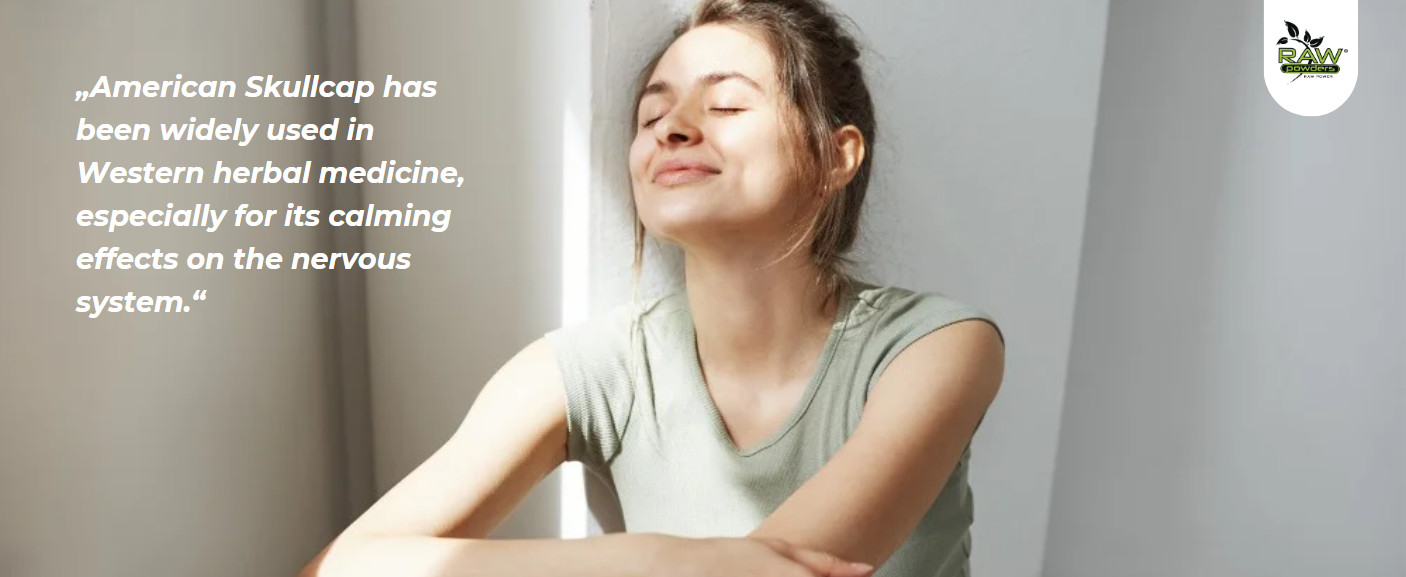SKULLCAP BENEFITS AND EFFECTS: A VERSATILE HERBAL REMEDY


Skullcap, belonging to the mint family, has played a pivotal role in herbal medicine for centuries. Its rich history and wide array of health benefits make it a standout herb in both traditional and contemporary medicinal practices. The herb is known for its two popular varieties: American Skullcap (Scutellaria lateriflora) and Chinese Skullcap (Scutellaria baicalensis), each offering unique therapeutic properties.
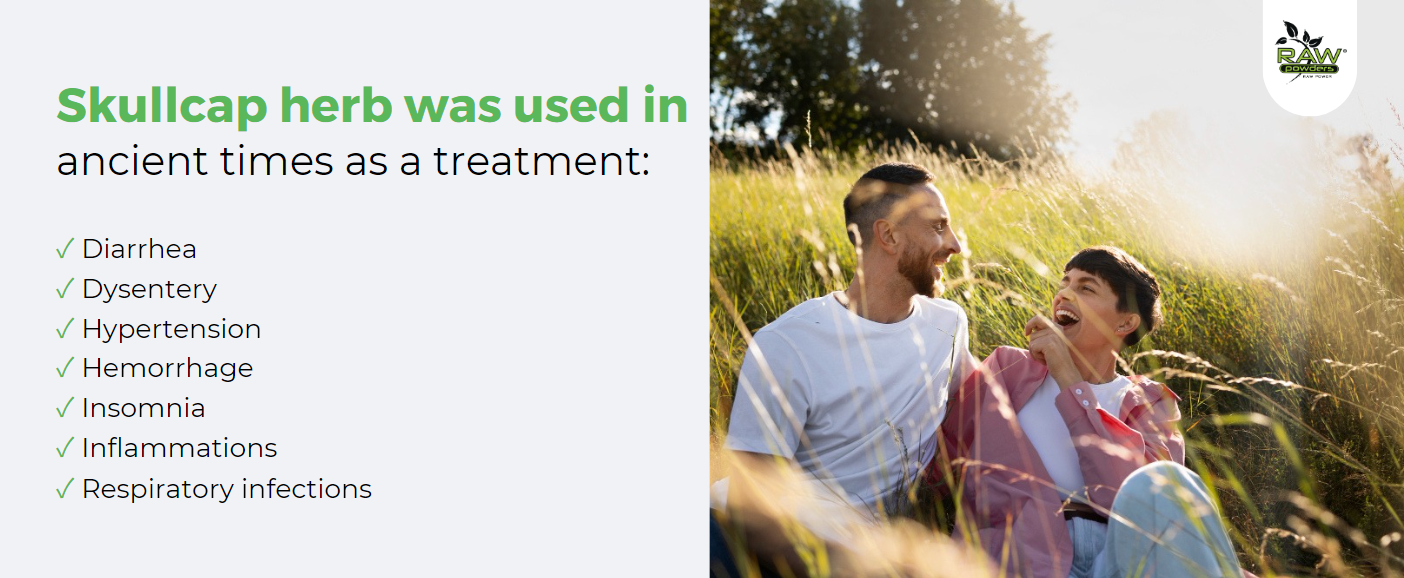
Historical and Ethnopharmacological Significance
Skullcap has been a staple in various traditional medicine systems across the world. In particular, Chinese Skullcap, or Scutellaria baicalensis, known as Huang Qin in traditional Chinese medicine, has been used for thousands of years. Its applications in ancient practices include treatments for diarrhea, dysentery, hypertension, hemorrhaging, insomnia, inflammation, and respiratory infections [1]. The root of this herb is particularly rich in bioactive compounds, including baicalin and wogonoside, which contribute to its wide range of pharmacological functions, such as hepatoprotective, antibacterial, antiviral, antioxidant, anticonvulsant, and neuroprotective effects.
American Skullcap in Western Herbal Medicine
American Skullcap has been widely used in Western herbal medicine, especially for its calming effects on the nervous system. This has made it a popular choice for the treatment of anxiety and related disorders. Herbal medicine practitioners highly regard Scutellaria lateriflora for its effectiveness in reducing anxiety and stress [2]. It is reported to be one of the most widely used medicinal herbs, with a reputation for having minimal side effects and no known toxicity.
Contemporary Research and Applications
Recent studies have continued to explore the potential of Skullcap in various therapeutic areas. For instance, research on Scutellaria baicalensis has delved into its anti-allergic properties, focusing on how it modulates T-cell mediated responses and its preventive effects in models of food allergy [3]. Additionally, the interest in Scutellaria lateriflora's anxiolytic properties has been reflected in clinical studies assessing its effects on mood in healthy volunteers, further cementing its role as a valuable nervine herb [4].
Types of Skullcap
1. American Skullcap (Scutellaria lateriflora)
Native to North America, American Skullcap has been traditionally used by Native American tribes and later adopted by European settlers. It is particularly noted for its nerve-soothing properties. Traditionally, it has been used to treat conditions like anxiety, insomnia, and convulsions. Modern research suggests that American Skullcap may have anxiolytic effects, making it a potential natural remedy for anxiety disorders. Additionally, its potential in neuroprotective applications has opened avenues for research in age-related neurological disorders.
2. Chinese Skullcap (Scutellaria baicalensis)
Originating from East Asia, Chinese Skullcap has been a key component in traditional Chinese medicine for centuries. It is highly regarded for its anti-inflammatory properties, making it useful in treating conditions like arthritis and allergies. The antioxidant properties of this variety contribute to its use in liver protection and as a supportive treatment in cancer therapy. Recent studies have focused on the anti-cancer properties of its bioactive compounds, particularly baicalin and baicalein, which have shown promising results in inhibiting tumor growth and inducing apoptosis in cancer cells [5, 6, 7, 8]:
- General Pharmacological Properties: Chinese Skullcap is noted for its antioxidant, anti-inflammatory, and hepatoprotective properties. The active compounds baicalin and baicalein play significant roles in these effects, which are beneficial in managing oxidative stress-related diseases[5].
- Anti-Cancer Effects: A comprehensive review highlighted the anti-cancer activities of baicalein and baicalin, specifically their ability to inhibit tumor growth and induce apoptosis in various cancer cell lines, including lung cancer. The compounds interfere with cell proliferation, metastasis, and survival pathways [6].
- Anti-Inflammatory and Immunomodulatory Effects: The active substances in Chinese Skullcap, including baicalein, baicalin, and wogonin, have shown potential in reducing inflammatory cytokines and mediators, such as IL-1β, IL-6, TNF-α, and nitric oxide. These effects make it a promising candidate for treating inflammation-related conditions [7].
- Therapeutic Potential in Various Diseases: Beyond its anti-cancer properties, Scutellaria baicalensis has been studied for its potential therapeutic applications in conditions like inflammatory bowel disease, liver diseases, and neuroprotection. Its components have been found to protect against various pathological processes, including oxidative stress and inflammation [8].
These studies collectively highlight the broad spectrum of biological activities exhibited by Scutellaria baicalensis, particularly its potential use in treating inflammation, cancer, and other diseases.
Both American and Chinese Skullcap varieties bring a wealth of medicinal properties to the table, making Skullcap a valuable herb in the realm of natural remedies. Its applications in treating a wide range of conditions from stress and anxiety to inflammation and cancer highlight its importance in both traditional and modern medicine. As research continues, the full potential of Skullcap in healthcare is yet to be completely unveiled.
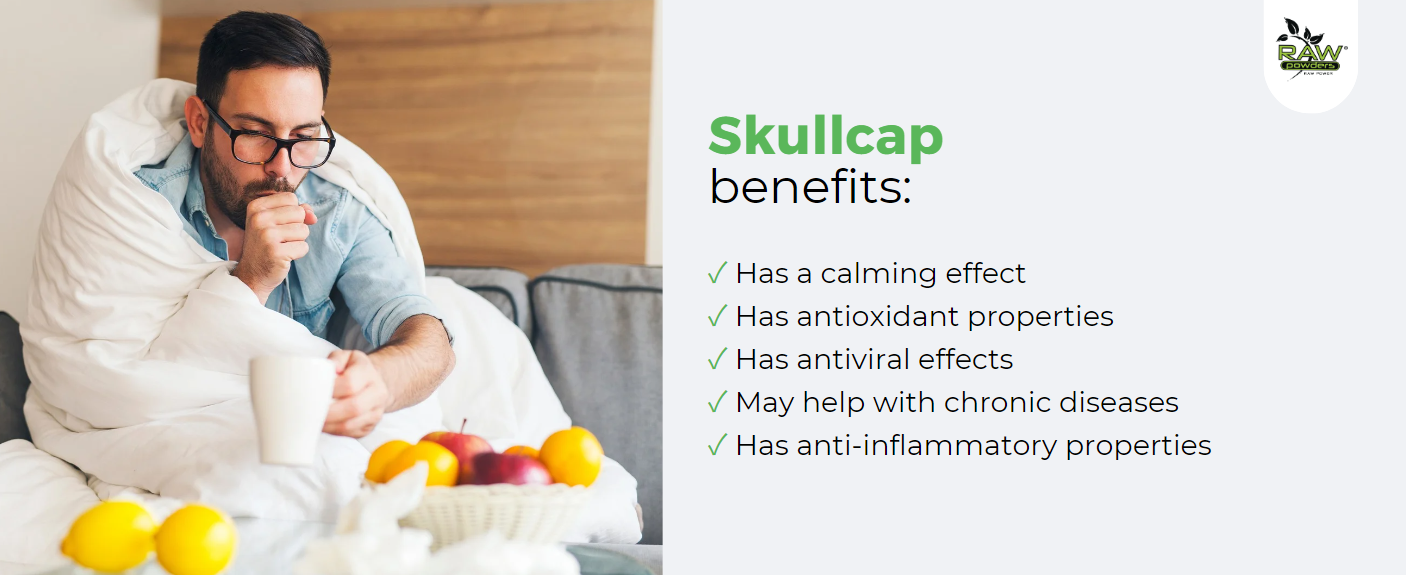
Benefits of Skullcap
Skullcap, encompassing American (Scutellaria lateriflora) and Chinese (Scutellaria baicalensis) varieties, offers a range of health benefits, making it a valuable herb in both traditional and modern medicine.
So far, over 40 compounds have been isolated and identified from Scutellaria baicalensis, including flavonoids, terpenoids, volatile oils and polysaccharides. The compounds and extracts isolated from Scutellaria baicalensis exhibit a wide range of pharmacological activities, including the effects on the nervous system, effects on the immune system, liver protection, antitumor effects, antibacterial and antiviral effects, antioxidant effects and other pharmacological effects [9].
For example, it was shown that Baicalin, a naturally occurring flavonoid, and the most abundant compound of Chinese Skullcap protects the central nervous system through anti-neuroinflammatory and anti-neuronal apoptotic effects, suppresses obesity through anti-inflammatory and antioxidant effects, and alleviates intestinal disorders through regulatory effects on intestinal microorganisms and short-chain fatty acid production [10].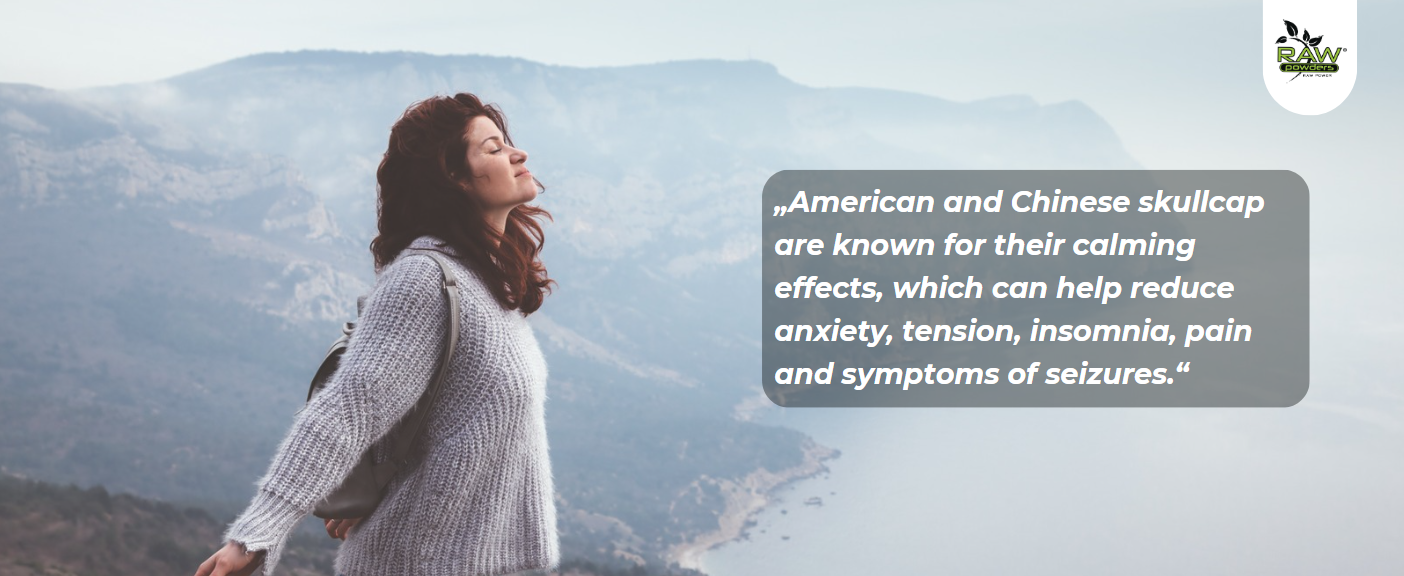
1. Calming Effects
The American skullcap is celebrated for its soothing properties. It's used to reduce anxiety, nervous tension, and to alleviate symptoms of convulsions. This makes it a potentially beneficial herb for those seeking natural remedies for stress and anxiety disorders.
Anxiety Reduction:
- American skullcap has been primarily used for reducing symptoms associated with hyperarousal disorders like anxiety, seizures, insomnia, and pain. A comprehensive description of its ethnopharmacological role and medicinal applications highlights its central nervous system benefits [11].
- Chinese Skullcap also demonstrate such effects. Studies show that Baicalin,a naturally occurring flavonoid, and the most abundant compound of Scullap S. baicalensis can exhibit biphasic effects on sleep-wake regulation, and demonstrates an anxiolytic-like effect via activation of γ-aminobutyric acid-A (GABA-A) receptors [12].
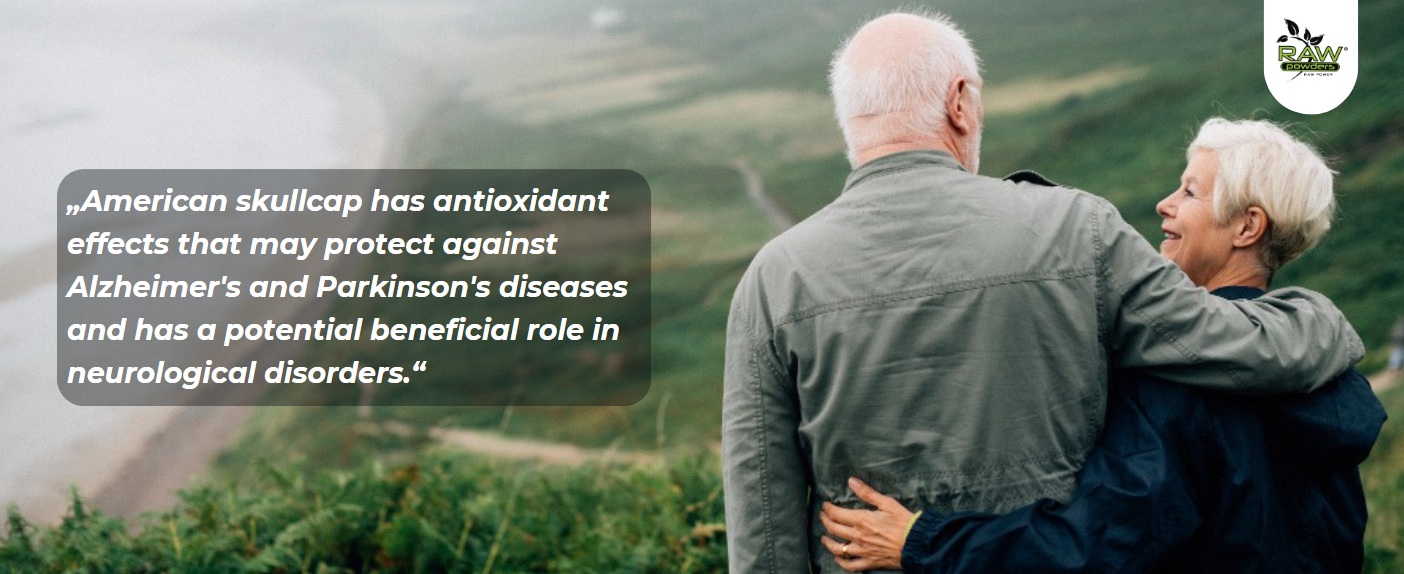
2. Neuroprotective Potential
Intriguingly, American skullcap exhibits significant antioxidant effects, which might offer protection against neurological disorders like Alzheimer's and Parkinson's diseases.
For example, it was shown in one in vitro study that Baikal skullcap extract produced a dose-dependent stimulating effect on neurite growth in neurons of dorsal root ganglia [13].
Antioxidant Effects:
- Studies on the chemical composition of American skullcap indicate the presence of flavonoids, which contribute to its neuroprotective and antioxidant properties. This suggests potential benefits in neurological disorders like Alzheimer's and Parkinson's diseases [14].
- For example, results of one study that investigated antioxidant properties of Skullcap suggest that flavonoids in the radix of Scutellaria baicalensis with o-di-hydroxyl group in A the ring, such as baicalein and baicalin, could be good free radical scavengers and might be used to cure head injury associated with free radical assault [15].
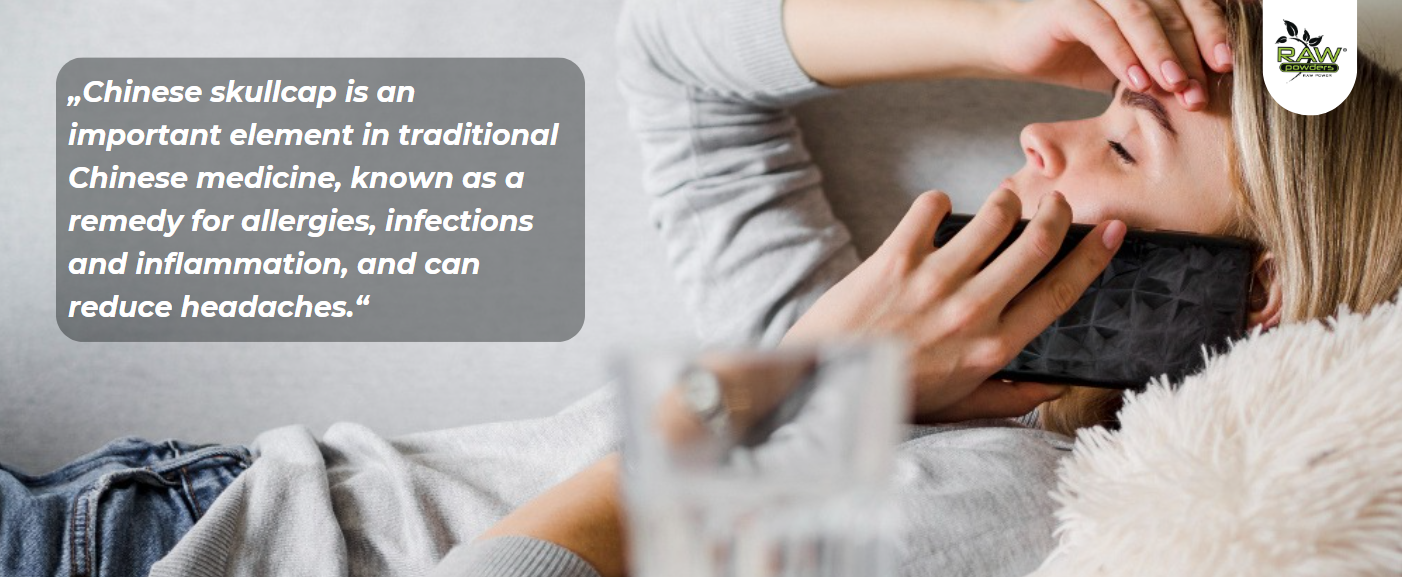
3. Chinese Skullcap in Traditional Medicine
The Chinese variety has been a staple in traditional Chinese medicine, known for treating allergies, infections, and inflammation. It's also used for its potential to relieve headaches.
Traditional Medicine Applications:
- Chinese skullcap has been traditionally used for treating allergies, infections, and inflammation. Its root extracts are known for their diverse pharmacological functions including anticancer, antibacterial, and antiviral properties [16].
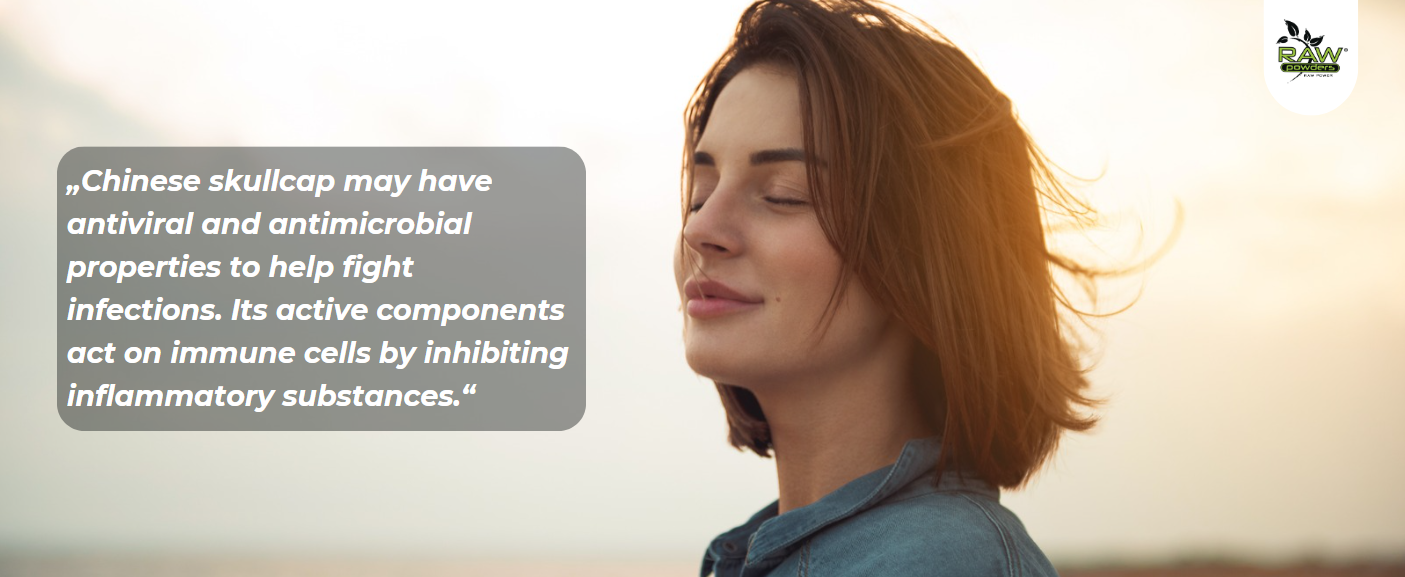
4. Potential Antiviral and Antifungal Properties
Chinese skullcap may possess antiviral and antifungal effects, broadening its scope in combating various infections.
The main active substances of S. baicalensis, baicalein, baicalin, wogonin, wogonoside, and oroxylin A, can act directly on immune cells, and inhibit the production of the inflammatory cytokines and other inflammatory mediators as shown in these studies about bioactive compounds:
- Taking into account that in addition to the downregulation of cytokine production, the active constituents of S. baicalensis also have antiviral and antibacterial effects, preliminary studies show that they may be more promising candidate therapeutics for the prevention of infection-related cytokine storms than are drugs having only antimicrobial or anti-inflammatory activities [17].
- For example, in one in vitro study flavonoids of Baikal skullcap extract produced an in vitro inhibitory effect on tick-borne encephalitis virus due to their direct virucidal activity and direct inhibition of adsorption and intracellular replication of tick-borne encephalitis virus, which determines their value as highly effective antiviral drugs [18].
- Also it was shown that Baicalin improves survival of mice with polymicrobial sepsis, and this may be attributed to its antibacterial property as well as its anti-inflammatory and anti-apoptotic effects [19].
- In another study two components with potent antifungal activity, baicalein and wogonin, were identified in Scutellaria root extract. Baicalein showed potent antifungal activity against the four fungi tested. Wogonin displayed antifungal activity against all four fungi except C. albicans. The components are considered to induce apoptosis-like programmed cell death via hyperproduction of reactive oxygen species. This study enhances our understanding of the scullcap antifungal properties, and may contribute to the development of new and safe antifungal therapeutics [20].
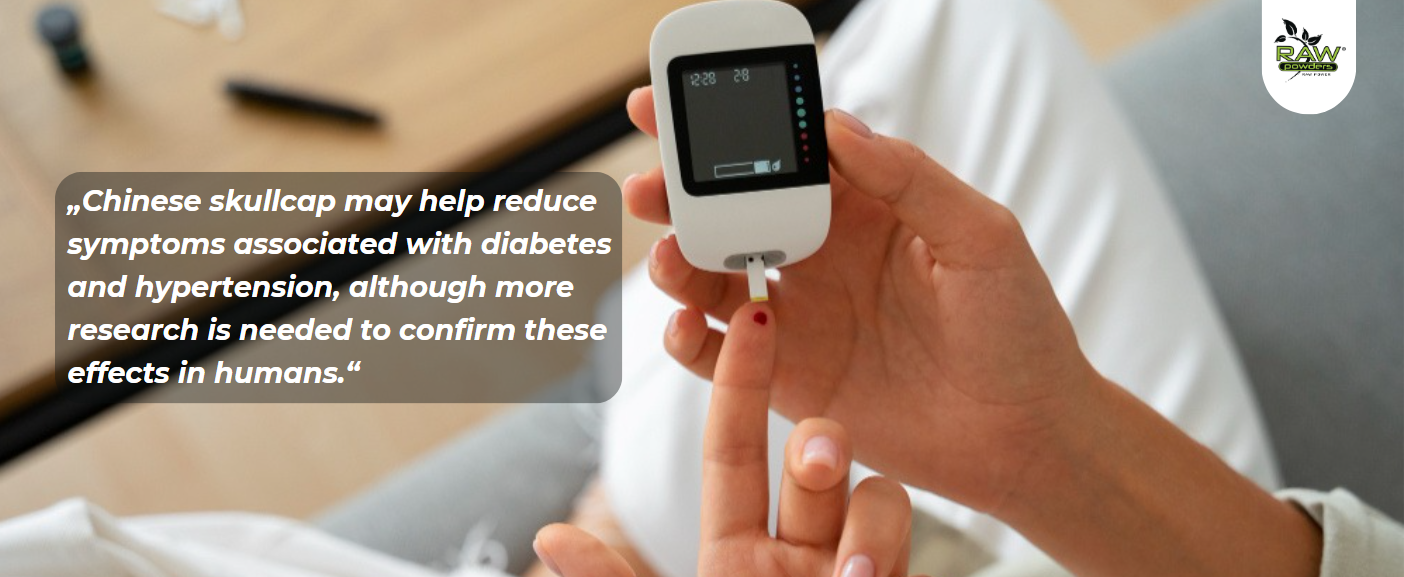
5. Possible Benefits for Chronic Conditions
Diabetes and Hypertension:
- Preliminary research on Chinese skullcap suggests potential benefits in reducing symptoms associated with chronic conditions like diabetes and hypertension, although more human studies are required for confirmation [21].
- In one rat study it was shown that baicalein pretreatment might have a potential benefit in prevention and terminating ischemic heart diseases like myocardial infarction [22].
Joint diseases:
- It was shown that Baicalin application attenuated muscle dysfunction in Osteoarthritis (OA) rats [23].
- Also another study assumes that the therapeutic mechanism of Scutellaria baicalensis associated with Ankylosing Spondylitis (AS) can be characterized as a multicomponent, multitarget, and multipathway mechanism. SBG may be a promising therapeutic candidate for AS [24].
6. Other studies that investigate potential effects of Chinese Skullcap
- One animal study demonstrated the efficacy of Chinese Skullcap root extract (SRE) in testosterone-induced Benign prostatic hyperplasia (BPH) rats and investigated the exact regulatory mechanism involved. Based on results of the study, authors propose that Chinese Skullcap Extract suppresses abnormal androgen events in prostate tissue and inhibits the development of BPH by targeting inflammation- and apoptosis-related markers. In the authors' opinion, these findings reinforce that SRE could be used as a plant-based 5α-reductase inhibitory alternative [25].
- Also, In vitro studies have shown that baicalein and baicalin, 2 major flavonoids of Scutellaria baicalensis Georgi, exhibit anticancer activity against several cancers [26].
- Another study assumes that Baicalin might inhibit cell proliferation and promote cell apoptosis in pancreatic cancer cells [27].
- The results of this study demonstrated that baicalin inhibited hepatic cancer cell growth and survival both in vitro and in vivo, suggesting that baicalin may be a potential phytochemical flavonoid for hepatic cancer therapy [28].
- Also it was shown that addition of Baikal skullcap root to the food of rabbits significantly increased the muscle protein content in comparison with control animals and hypercholesterolemic diet groups (CH). Moreover, supplementation with Baikal skullcap root (CH+SR) decreased about 15.6% fat level in comparison to hypercholesterolemic diet group [29].
- Results of one study suggest that ethanol extracts of the root from Scutellaria baicalensis Georgi (ESB) ameliorates penile erectile dysfunction via the activation of the NO/cGMP pathways of the penile corpus cavernosum in a streptozotocin-induced diabetic rat model [30].
Cautions and Considerations
While skullcap has numerous potential benefits, it's crucial to approach its use with caution. Both varieties of skullcap can interact with certain medications, particularly those with sedative effects. Also, the herb should be obtained from reliable sources to avoid contamination.
Read more about the possible side effects of taking skullcap in the blog post - Skullcap side effects.
In conclusion, skullcap's diverse range of potential health benefits makes it a fascinating herb in the realm of natural remedies. However, as with any herbal supplement, it's important to use skullcap extract supplements under the guidance of a healthcare provider, especially if you are taking other medications or have underlying health conditions.
For more information on skullcap dosage and use, see the blog - Skullcap dosage.
Medical Disclaimer
The information provided in our articles is solely for educational purposes and should not be considered medical advice or instruction. No action or inaction should be taken based solely on the contents of this information. Readers should consult their health care professional on any matter related to their health and well-being. The information and opinions provided here are believed to be accurate and sound, based on the best judgment available to the authors, but readers who fail to consult with appropriate health authorities assume the risk of any injuries. The publisher is not responsible for errors or omissions.
Please be aware that different countries may have specific regulations and that this disclaimer does not replace the need for consultation with a healthcare provider before beginning or changing a treatment or supplement regimen. The information contained in this article is not intended to diagnose, treat, cure, or prevent any disease. Individual results may vary.
References
- Zhao, Q., Chen, X., & Martin, C. (2016). Scutellaria baicalensis, the golden herb from the garden of Chinese medicinal plants. Science Bulletin, 61, 1391 - 1398. https://pubmed.ncbi.nlm.nih.gov/27730005/
- Brock, C., Whitehouse, J., Tewfik, I., & Towell, T. (2012). The use of Scutellaria lateriflora: a pilot survey amongst herbal medicine practitioners. Journal of Herbal Medicine, 2, 34-41. https://doi.org/10.1016/J.HERMED.2012.04.005.
- Shin, H., Bae, M., Choi, D., & Shon, D. (2014). Skullcap (Scutellaria baicalensis) Extract and Its Active Compound, Wogonin, Inhibit Ovalbumin-Induced Th2-Mediated Response. Molecules, 19, 2536 - 2545.
https://doi.org/10.3390/molecules19022536. https://pubmed.ncbi.nlm.nih.gov/24566319/ - Brock, C., Whitehouse, J., Tewfik, I., & Towell, T. (2014). American Skullcap (Scutellaria lateriflora): A Randomised, Double‐Blind Placebo‐Controlled Crossover Study of its Effects on Mood in Healthy Volunteers. Phytotherapy Research, 28.
https://doi.org/10.1002/ptr.5044. https://pubmed.ncbi.nlm.nih.gov/23878109/ - Chmiel, M., & Stompor-Gorący, M. (2023). Promising Role of the Scutellaria baicalensis Root Hydroxyflavone–Baicalein in the Prevention and Treatment of Human Diseases. International Journal of Molecular Sciences, 24. https://doi.org/10.3390/ijms24054732.
- Chandrashekar, N., & Pandi, A. (2022). Baicalein: A review on its anti-cancer effects and mechanisms in lung carcinoma.. Journal of food biochemistry, e14230 . https://doi.org/10.1111/jfbc.14230.
- Liao, H., Ye, J., Gao, L., & Liu, Y. (2020). The main bioactive compounds of Scutellaria baicalensis Georgi. for alleviation of inflammatory cytokines: A comprehensive review.. Biomedicine & pharmacotherapy = Biomedecine & pharmacotherapie, 133, 110917 . https://doi.org/10.1016/j.biopha.2020.110917.
- Jang, J., Im, E., & Kim, N. (2023). Therapeutic Potential of Bioactive Components from Scutellaria baicalensis Georgi in Inflammatory Bowel Disease and Colorectal Cancer: A Review. International Journal of Molecular Sciences, 24. https://doi.org/10.3390/ijms24031954.
- Tiantian Zhao, Hailong Tang, Long Xie, Yu Zheng, Zubing Ma, Qiang Sun, Xiaofang Li. Scutellaria baicalensis Georgi. (Lamiaceae): a review of its traditional uses, botany, phytochemistry, pharmacology and toxicology. Review: J Pharm Pharmacol. 2019 Sep;71(9):1353-1369. doi: 10.1111/jphp.13129. Epub 2019 Jun 24. PMID: 31236960. https://pubmed.ncbi.nlm.nih.gov/31236960/
- Qichao Hu 1, Shuyu Hou 1, Baoyi Xiong 2 3, Yueqiang Wen 4, Jundong Wang 1 5, Jinhao Zeng 2 5, Xiao Ma 1, Fang Wang 6. Therapeutic Effects of Baicalin on Diseases Related to Gut-Brain Axis Dysfunctions. Review: Molecules. 2023 Sep 7;28(18):6501. doi: 10.3390/molecules28186501. PMID: 37764277 PMCID: PMC10535911. https://pubmed.ncbi.nlm.nih.gov/37764277/
- Lohani, M., Patel, M., Majrashi, M., Joshi, S., Kemppainen, B., Mulabagal, V., & Dhanasekaran, M. (2016). Ethnopharmacological Importance of Western Medicinal Herb, Scutellaria lateriflora. 37-72. https://doi.org/10.1007/978-981-10-1085-9_2.
- Han-Han Chang, Pei-Lu Yi, Chiung-Hsiang Cheng, Chin-Yu Lu, Yi-Tse Hsiao, Yi-Fong Tsai, Chia-Ling Li, Fang-Chia Chang. Biphasic effects of baicalin, an active constituent of Scutellaria baicalensis Georgi, in the spontaneous sleep-wake regulation. J Ethnopharmacol. 2011 May 17;135(2):359-68. doi: 10.1016/j.jep.2011.03.023. Epub 2011 Mar 16. PMID: 21419210. https://pubmed.ncbi.nlm.nih.gov/21419210/
- A. Ya. Shurygin, N. V. Bezzubov, E. A. Ignatova, S. M. Nikolaev, I. V. Viktorov. Baikal skullcap extract stimulates neurite growth in cultures of rat dorsal root Ganglia. Bull Exp Biol Med. 2002 Jul;134(1):47-9. doi: 10.1023/a:1020656605212. PMID: 12459867. https://pubmed.ncbi.nlm.nih.gov/12459867/
- Lawson, S., Satyal, P., & Setzer, W. (2021). Phytochemical Analysis of the Essential Oils From Aerial Parts of Four Scutellaria “Skullcap” Species Cultivated in South Alabama: Scutellaria baicalensis Georgi, S. Barbata D. Don, S. Incana Biehler, and S. Lateriflora L. Natural Product Communications, 16. https://doi.org/10.1177/1934578X211025930.
- Z Gao, K Huang, X Yang, H Xu. Free radical scavenging and antioxidant activities of flavonoids extracted from the radix of Scutellaria baicalensis Georgi. Biochim Biophys Acta. 1999 Nov 16;1472(3):643-50. doi: 10.1016/s0304-4165(99)00152-x. PMID: 10564778. https://pubmed.ncbi.nlm.nih.gov/10564778/
- Zhao, Q., Chen, X., & Martin, C. (2016). Scutellaria baicalensis, the golden herb from the garden of Chinese medicinal plants. Science Bulletin, 61, 1391 - 1398. https://doi.org/10.1007/s11434-016-1136-5. https://pubmed.ncbi.nlm.nih.gov/27730005/
- Hengfeng Liao, Jun Ye, Lili Gao, Yuling Liu.The main bioactive compounds of Scutellaria baicalensis Georgi. for alleviation of inflammatory cytokines: A comprehensive review. Review: Biomed Pharmacother. 2021 Jan:133:110917. doi: 10.1016/j.biopha.2020.110917. Epub 2020 Nov 17. PMID: 33217688. https://pubmed.ncbi.nlm.nih.gov/33217688/
- G. N. Leonova, A. L. Shutikova, V. A. Lubova, O. S. Maistrovskaya. Inhibitory Activity of Scutellaria baicalensis Flavonoids against Tick-Borne Encephalitis Virus. Bull Exp Biol Med. 2020 Mar;168(5):665-668. doi: 10.1007/s10517-020-04776-y. Epub 2020 Apr 4. PMID: 32246365. https://pubmed.ncbi.nlm.nih.gov/32246365/
- Jiali Zhu, Jiafeng Wang, Ying Sheng, Yun Zou, Lulong Bo, Fei Wang, Jingsheng Lou, Xiaohua Fan, Rui Bao, Youping Wu, Feng Chen, Xiaoming Deng, Jinbao Li. Baicalin improves survival in a murine model of polymicrobial sepsis via suppressing inflammatory response and lymphocyte apoptosis. PLoS One. 2012;7(5):e35523. doi: 10.1371/journal.pone.0035523. Epub 2012 May 8. PMID: 22590504 PMCID: PMC3348138. https://pubmed.ncbi.nlm.nih.gov/22590504/
- Xia Da, Yayoi Nishiyama, Duerna Tie, Kyaw Zaw Hein, Osamu Yamamoto, Eishin Morita. Antifungal activity and mechanism of action of Ou-gon (Scutellaria root extract) components against pathogenic fungi. Sci Rep. 2019 Feb 8;9(1):1683. doi: 10.1038/s41598-019-38916-w. PMID: 30737463 PMCID: PMC6368610. https://pubmed.ncbi.nlm.nih.gov/30737463/
- Billah, M., Khan, F., & Niaz, K. (2019). Scutellaria baicalensis Georgi. Nonvitamin and Nonmineral Nutritional Supplements. https://doi.org/10.1016/B978-0-12-812491-8.00054-0.
- Mukesh Kumar, Eshvendar Reddy Kasala, Lakshmi Narendra Bodduluru, Vicky Dahiya, Mangala Lahkar. Baicalein protects isoproterenol induced myocardial ischemic injury in male Wistar rats by mitigating oxidative stress and inflammation. Inflamm Res. 2016 Aug;65(8):613-22. doi: 10.1007/s00011-016-0944-z. Epub 2016 Apr 12. PMID: 27071824. https://pubmed.ncbi.nlm.nih.gov/27071824/
- De-Sheng Chen, Jian-Gang Cao, Bo Zhu, Zeng-Liang Wang, Tong-Fu Wang, Jian-Jun Tang. Baicalin Attenuates Joint Pain and Muscle Dysfunction by Inhibiting Muscular Oxidative Stress in an Experimental Osteoarthritis Rat Model. Arch Immunol Ther Exp (Warsz). 2018 Dec;66(6):453-461. doi: 10.1007/s00005-018-0518-6. Epub 2018 Aug 3. PMID: 30076457. https://pubmed.ncbi.nlm.nih.gov/30076457/
- Xu Li, Jian Liu, Yanyan Fang, Dan Huang, Mingyu He, Fanfan Wang, Qi Han. Potential Therapeutic Mechanism of Scutellaria baicalensis Georgi against Ankylosing Spondylitis Based on a Comprehensive Pharmacological Model. Biomed Res Int. 2022 Dec 21:2022:9887012. doi: 10.1155/2022/9887012. eCollection 2022. PMID: 36588535 PMCID: PMC9797298. https://pubmed.ncbi.nlm.nih.gov/36588535/
- Bo-Ram Jin 1, Kyung-Sook Chung 2, Hyo-Jung Kim 3, Hyo-Jin An 4. Chinese Skullcap (Scutellaria baicalensis Georgi) inhibits inflammation and proliferation on benign prostatic hyperplasia in rats. Comparative Study: J Ethnopharmacol. 2019 May 10:235:481-488. doi: 10.1016/j.jep.2019.01.039. Epub 2019 Jan 29. PMID: 30708034. https://pubmed.ncbi.nlm.nih.gov/30708034/
- Jun-Jen Liu, Tien-Shang Huang, Wen-Fang Cheng, Fung-Jou Lu. Baicalein and baicalin are potent inhibitors of angiogenesis: Inhibition of endothelial cell proliferation, migration and differentiation. Int J Cancer. 2003 Sep 10;106(4):559-565. doi: 10.1002/ijc.11267. PMID: 12845652. https://pubmed.ncbi.nlm.nih.gov/12845652/
- Qin Huang, Jinshun Zhang, Jinbang Peng, Yan Zhang, Linlin Wang, Juju Wu, Liping Ye, Congcheng Fang. Effect of baicalin on proliferation and apoptosis in pancreatic cancer cells. Am J Transl Res. 2019 Sep 15;11(9):5645-5654. eCollection 2019. PMID: 31632536. https://pubmed.ncbi.nlm.nih.gov/31632536/
- Yang Yu, Mingyan Pei, Ling Li. Baicalin induces apoptosis in hepatic cancer cells in vitro and suppresses tumor growth in vivo. Int J Clin Exp Med. 2015 Jun 15;8(6):8958-67. eCollection 2015. PMID: 26309548. https://pubmed.ncbi.nlm.nih.gov/26309548/
- Bozena Króliczewska, Dorota Miśta, Wojciech Zawadzki, Teresa Skiba. Effect of baikal skullcap root (Scutellaria baicalensis radix) on cholesterol level and meat quality in rabbits fed a cholesterol rich diet. Folia Biol (Krakow). 2011;59(3-4):169-73. doi: 10.3409/fb59_3-4.169-173. PMID: 22195472. https://pubmed.ncbi.nlm.nih.gov/22195472/
- Xiang Li, Yun Jung Lee, Hye Yoom Kim, Rui Tan, Min Cheol Park, Dae Gill Kang, Ho Sub Lee. Beneficial Effects of Scutellaria baicalensis on Penile Erection in Streptozotocin-Induced Diabetic Rats. Am J Chin Med. 2016;44(2):305-20. doi: 10.1142/S0192415X1650018X. PMID: 27080943. https://pubmed.ncbi.nlm.nih.gov/27080943/





_front%20(1)-250x250.png)



_front%20(1)-250x250.png)

-(NN)_front%20(1)-min-250x250.png)

_front%20(1)-250x250.png)


_front%20(1)-min-250x250.png)
_front%20(1)%20(1)-250x250.png)
_front%20(1)%20(1)-250x250.png)
_front%20(1)-min-250x250.png)
_front%20(1)-min-250x250.png)
_front%20(1)%20(1)-250x250.png)
_front%20(1)%20(1)-250x250.png)
